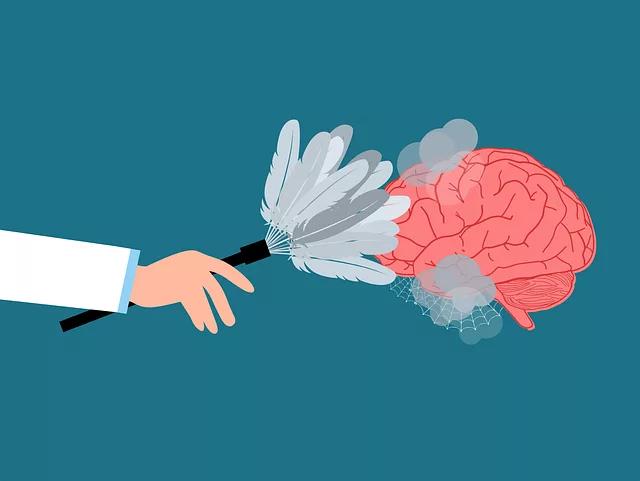Kaiser's Broomfield inpatient mental health facilities prioritize stress management through tailored workshops addressing workload pressures, patient care, and interpersonal dynamics. These sessions incorporate evidence-based techniques like mindfulness, CBT, and progressive muscle relaxation, fostering resilience and well-being. Cultural sensitivity, interactive discussions, and real-life scenario role-plays are key, enhanced by local resources and mental health policy analysis. Success is measured through feedback, assessments, and behavioral tracking, enabling continuous improvement and potential reduction in future inpatient care needs.
Stress management workshops are gaining prominence, especially within healthcare institutions like Kaiser Broomfield, which prioritizes patient well-being. This article delves into the significance of such programs, offering a comprehensive guide. We explore ‘Understanding Stress and Its Impact’ to uncover the need for tailored interventions. Subsequently, we provide practical strategies for designing engaging workshops, with a case study on Kaiser’s inpatient mental health initiatives. Finally, we discuss evaluation methods to ensure continuous improvement in stress management programs, addressing key concerns relevant to healthcare organizations.
- Understanding Stress and Its Impact: Exploring the Need for Workshops
- Designing Effective Stress Management Workshops: Strategies and Techniques
- Organizing and Facilitating Inpatient Mental Health Workshops at Kaiser Broomfield
- Measuring Success: Evaluation and Continuous Improvement of Stress Management Programs
Understanding Stress and Its Impact: Exploring the Need for Workshops

Stress is an inevitable part of life, but when left unmanaged, it can lead to significant physical and mental health issues. In the fast-paced healthcare industry, professionals like those at Kaiser’s inpatient mental health facilities in Broomfield are increasingly facing high-stress work environments. This has led to a growing need for effective stress management workshops.
These workshops aim to explore the root causes of stress, whether it stems from heavy workloads, patient care demands, or interpersonal challenges. By understanding the impact of stress on both individual well-being and organizational performance, healthcare providers can learn valuable communication strategies and burnout prevention techniques. Additionally, activities like Mental Wellness Journaling Exercises can offer a space for reflection, helping participants develop coping mechanisms to navigate stressful situations with resilience and improved mental clarity.
Designing Effective Stress Management Workshops: Strategies and Techniques

Effective stress management workshops require careful design to cater to diverse needs and backgrounds. Incorporating evidence-based techniques like mindfulness exercises, cognitive behavioral therapy (CBT) strategies, and progressive muscle relaxation can significantly enhance participants’ ability to manage stress. Facilitators should also prioritize Cultural Sensitivity in Mental Healthcare Practice, ensuring inclusive activities that respect and incorporate varied cultural perspectives.
Beyond coping mechanisms, workshops should foster Resilience Building through interactive discussions, group exercises, and real-life scenario role-plays. Encouraging participants to share their experiences and learn from one another strengthens their collective resilience. Given the regional focus on mental health services, such as those offered by Kaiser’s inpatient mental health facilities in Broomfield, workshop organizers can leverage local resources for case studies and expert insights, enriching the learning experience for attendees. Additionally, integrating Mental Health Policy Analysis and Advocacy into the curriculum encourages participants to understand and influence systemic changes promoting accessible and effective mental healthcare.
Organizing and Facilitating Inpatient Mental Health Workshops at Kaiser Broomfield

Kaiser Broomfield has been at the forefront of mental health awareness and support within its community, organizing and facilitating inpatient mental health workshops to address a range of issues. These sessions are designed to foster emotional healing processes and Mental Illness Stigma Reduction Efforts, providing a safe space for patients to explore their experiences. The workshops focus on various topics, including Confidence Boosting techniques, mindfulness practices, and coping strategies tailored to individual needs.
Trained facilitators play a crucial role in guiding participants through these sensitive discussions, ensuring that everyone feels supported and empowered. By integrating interactive activities and peer support, the workshops aim to enhance overall well-being and equip individuals with valuable tools to manage stress and anxiety effectively. This commitment to mental health initiatives reflects Kaiser Broomfield’s dedication to serving the community holistically.
Measuring Success: Evaluation and Continuous Improvement of Stress Management Programs

Measuring success is a vital aspect of evaluating and improving any stress management program, especially when considering programs like Kaiser’s inpatient mental health services in Broomfield. The effectiveness of such initiatives can be gauged through various methods, including participant feedback forms, post-workshop assessments, and tracking long-term behavioral changes. By collecting qualitative and quantitative data, organizers can identify areas of excellence and potential shortcomings. For instance, Emotional Intelligence (EI) training sessions might enhance participants’ ability to recognize and manage their emotions, leading to improved mental wellness journaling practices.
Continuous improvement is key in the design of Mental Health Education Programs. Regular reviews should incorporate guidance from experts and feedback from previous attendees. This iterative process allows for refining the curriculum, ensuring that each workshop session builds upon the last, fostering a holistic approach to stress management. Such an evaluation framework not only benefits individual participants but also contributes to the overall improvement of mental health services, potentially reducing the need for more intensive inpatient care in the future.
Stress management workshops, as demonstrated by Kaiser’s successful implementation at Broomfield, are valuable tools for improving mental well-being. By understanding stress, designing effective programs, and continuously evaluating their impact, organizations like Kaiser can foster healthier environments. The case study highlights the positive outcomes achievable through structured interventions tailored to address stress in various settings, including inpatient mental health facilities. This approach not only benefits individuals but also contributes to a more resilient and productive community overall.






